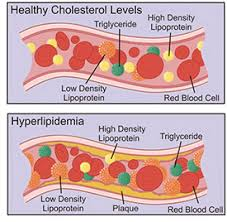A nurse is assessing a client who has been taking simvastatin to treat hyperlipidemia. Which statement made by the client describes an adverse effect of the medication that should be reported to the provider immediately?
"I've had gas pains for the last day."
"I've had a headache for a couple of days."
"I have occasional constipation."
"My legs feel weak, and I get pain in my calves."
The Correct Answer is D
Choice A Reason:
Gas pains, while uncomfortable, are not typically a serious adverse effect of simvastatin and do not usually require immediate medical attention unless they are severe or persistent.
Choice B Reason:
Headaches are a common side effect of many medications, including simvastatin, and are not generally considered an emergency. However, if the headache is severe, persistent, or accompanied by other symptoms, it should be reported to a healthcare provider.
Choice C Reason:
Occasional constipation is another common side effect and is not usually a cause for immediate concern unless it becomes severe or chronic.
Choice D Reason:
Muscle weakness and pain, especially in the calves, can be a sign of a serious condition called rhabdomyolysis, which is a rare but serious adverse effect of statins like simvastatin. This condition involves the breakdown of muscle tissue and can lead to kidney damage. It should be reported to a healthcare provider immediately.

Nursing Test Bank
Naxlex Comprehensive Predictor Exams
Related Questions
Correct Answer is D
Explanation
Choice A Reason
A creatinine level of 0.8 mg/dL falls within the normal range for adults, which is typically 0.6 to 1.2 mg/dL for males and 0.5 to 1.1 mg/dL for females. This indicates normal kidney function and is not a cause for immediate intervention post-operatively.
Choice B Reason
A potassium level of 4.2 mEq/L is within the normal range, which is generally between 3.6 and 5.2 mEq/L. This level indicates a stable electrolyte balance and is not a cause for immediate concern following shoulder replacement surgery.
Choice C Reason
A white blood cell (WBC) count of 9,000 mm³ is within the normal range, which typically spans from 4,500 to 11,000 WBCs per mm³. This suggests there is no active infection or inflammation that requires immediate intervention.
Choice D Reason
A hemoglobin level of 7.1 g/dL is considered low, as the normal range for adult males is generally 13.8 to 17.2 g/dL and for adult females is 12.1 to 15.1 g/dL. Low hemoglobin can indicate anemia, which may be due to blood loss during surgery or other underlying conditions. This requires immediate intervention to address potential oxygenation issues and determine the cause of the anemia.
Correct Answer is A
Explanation
Choice A reason:
Isoniazid, an antitubercular medication, can cause peripheral neuropathy, a form of nerve damage characterized by numbness, tingling, or pain, particularly in the hands and feet. This side effect is due to the drug's interference with the normal metabolism of vitamin B6 (pyridoxine). Supplementation with vitamin B6 is recommended to prevent this complication. The normal daily recommended intake for vitamin B6 in adults ranges from 1.3 to 1.7 mg.
Choice B reason:
While it is true that isoniazid can cause discoloration of bodily fluids, turning urine and tears orange, this is not a harmful side effect and does not require intervention. It is, however, important to inform the client of this possibility to prevent alarm.
Choice C reason:
There is no evidence to suggest that routine hearing exams are necessary for clients taking isoniazid unless they have pre-existing hearing conditions or are taking other medications known to affect hearing. Therefore, this is not a standard part of the teaching plan for clients on isoniazid.
Choice D reason:
Photosensitivity reactions are not commonly associated with isoniazid use. While wearing sunscreen is generally good advice for skin protection, it is not specifically related to the administration of isoniazid and thus would not be the primary information to include in the teaching plan.
Whether you are a student looking to ace your exams or a practicing nurse seeking to enhance your expertise , our nursing education contents will empower you with the confidence and competence to make a difference in the lives of patients and become a respected leader in the healthcare field.
Visit Naxlex, invest in your future and unlock endless possibilities with our unparalleled nursing education contents today
Report Wrong Answer on the Current Question
Do you disagree with the answer? If yes, what is your expected answer? Explain.
Kindly be descriptive with the issue you are facing.
